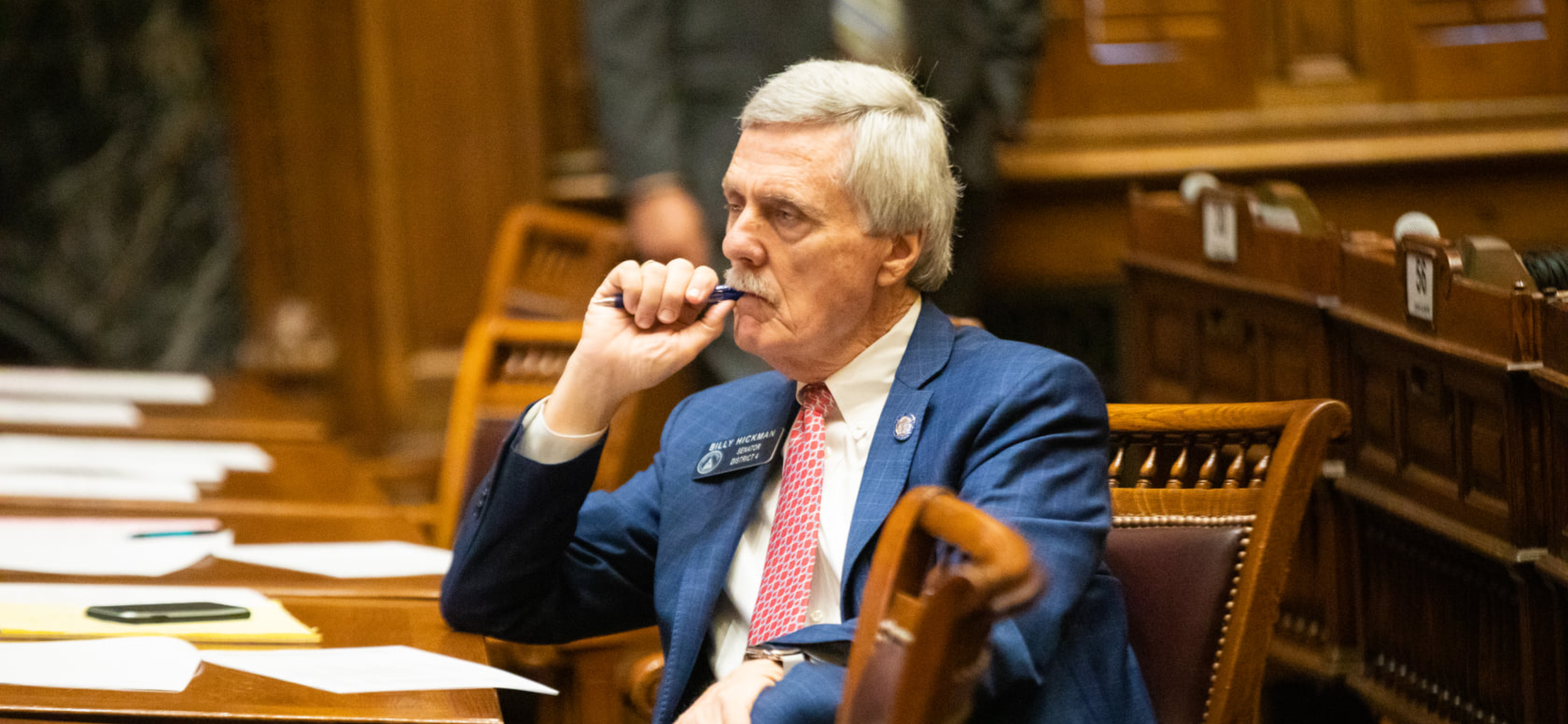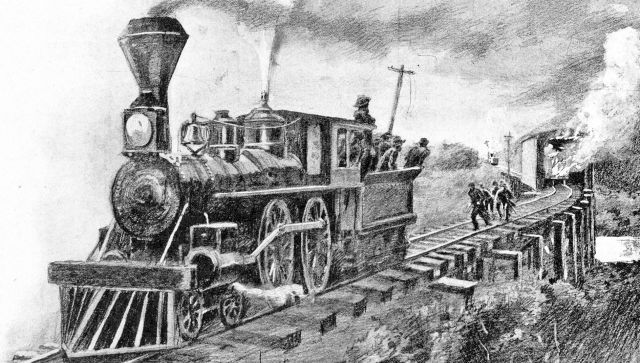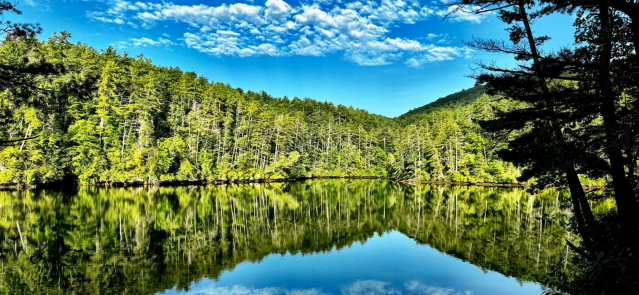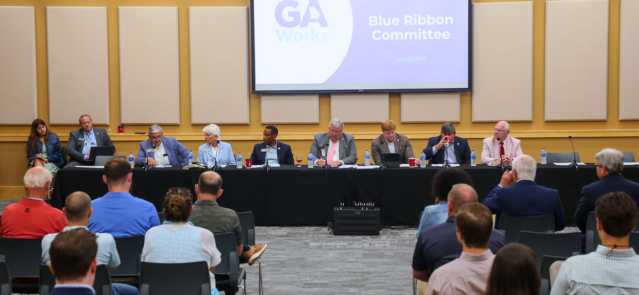Stay ahead of the curve as a political insider with deep policy analysis, daily briefings and policy-shaping tools.
Request a DemoGeorgia farmland is disappearing. Sen. Billy Hickman wants to preserve it

Billy Hickman sits at his desk in the Senate chamber. (Credit: Georgia Senate)
- Georgia has lost more than 2.6 million acres of farmland since 1974 to development and industry
- Study committee will look at farmland loss, including possible purchases by foreign adversaries
Over the past 50 years, Georgia has lost over 2.6 million acres of farmland to development and industry. The new $8 billion Hyundai plant, anchored between Bryant and Bulloch counties, with its promise of 8,000 jobs, only adds to Georgia farmers’’ concerns.
“It really is an issue that we need to be taking a hard look at,” Sen. Billy Hickman, R-Statesboro, told State Affairs.
Lawmakers responded to those concerns this past legislative session, creating the Senate Study Committee on the Preservation of Georgia’s Farmlands. Hickman will chair the seven-member committee. Other members include Sen. Jason Anavitarte, R-Dallas; Sen. Brandon Beach, R-Alpharetta; Sen. Jason Esteves, D-Atlanta; Sen. Russ Goodman, R-Cogdell; Sen. Freddie Powell Sims, D-Dawson; and Sen. Sam Watson, R-Moultrie.
Hickman, a certified public accountant who has worked with farmers and owns a farm, spoke with State Affairs about concerns and challenges the committee will address throughout the summer, beginning with its first hearing in Statesboro in July.
The conversation has been edited for clarity and length.
Q. There was a lot of talk during this past legislative session about foreign adversaries coming in and buying up land. This committee isn’t just about that?
A. That’s not what [the committee’s] all about. Georgia grew [by about] a million people in the last 10 years. So we know with that, they’ve got to have houses. They’ve got to have jobs. So along with that we’ve lost a good bit of farmland.
On one hand, that’s great because we’re providing jobs and opportunities for our people. On the other hand, we’re losing something that’s very critical to our state. Agriculture is the No. 1 industry in Georgia.
So as a result of the meeting [in Statesboro] and the concern of the Legislature and the concern of the lieutenant governor and the farmers, we thought we needed to have some meetings to discuss this. Out of meetings like this could arise some very critical bills to address these issues. What those are, at this point, I don’t have a clue, but I hope they come out of these meetings.
Q. But will the committee take up the issue of land loss due to foreign adversaries buying farmland?
A. We probably will because that’s a big deal. The title of our study committee is the “Preservation of Georgia’s Farmland.” So that could be anywhere from cropland to foreign investments to mining. That could also very well be solar farms. Solar farms have become a huge thing in Georgia, and a lot of farmland has been turned into solar farms.
Q. What are the committee’s goals?
A. Well, the main goal is to try to achieve some type of balance or some type of understanding of the need to preserve farmland but at the same time the need to provide jobs for our citizens. A lot of our areas in Georgia have huge unemployment and huge poverty numbers.
So we’ve got to be concerned about those citizens. We’ve got to be concerned about providing opportunities and jobs. And those jobs may be agriculture-related jobs and agriculture-related manufacturing as opposed to a farm. So we can have that same situation where we’re still maintaining a big processing plant for peanuts, maybe a big processing plant for cotton or something. Right now, we just need to address the issue. As far as I know, this issue has not been addressed in the state at this level before.
Q. What do you as chairman hope to accomplish through the committee?
A. My hope is to not only educate our committee on this but educate all of Georgia about the importance of farmland and the importance of having quality growth in jobs.
Q. Why should the average Georgian be concerned about preserving Georgia farmland?
A. We all love to eat. We need to produce our own food. If we ever get dependent on the world for food, we’re in trouble.
Also, we can’t have communist countries coming in and buying up land next to our military bases. The foreign investment [ban] only applies to our adversaries.
Q. What type of recommendations are you looking to give to the Legislature?
A. I think we need to look at innovative measures. I’ll give you two examples.
I’ve had people talk to me about putting solar farms on top of landfills. I met with a person whose company manufactures fabric that goes on top of landfills. You don’t have to cut the grass at all.
We’ve got a tremendous amount of warehouses all over Georgia. Well, maybe we need more concern about putting these solar farms on top of warehouses as opposed to putting them on [more] farmland.
I don’t even know if it’s a possibility, but that’s the type of stuff we need to be thinking more innovatively about — what we can do to protect the farmland.

The billy hickman files
Title: Georgia state senator representing District 4, which includes Bulloch, Candler, Effingham and Evans counties and part of Chatham County
Residence: Statesboro
Age: 71
Education: Bachelor of Business Administration with a specialty in accounting from Georgia Southern University
Occupation: Certified public accountant
Interests: Owns a 292-acre farm in Candler County where he has 100 pecan trees, 25 cows and 250 acres of pine trees
Family: He and his wife, Jo Ann, a retired teacher, have five grown sons and five grandsons.
Have questions, comments or tips? Contact Tammy Joyner on X @lvjoyner or at [email protected].
Biden awards Medal of Honor to Civil War train raiders
President Joe Biden is honoring two Civil War privates, whose remains lie in Chattanooga’s National Cemetery, with the Medal of Honor on Wednesday for conspicuous “gallantry and intrepidity” for their role in the Great Locomotive Chase of 1862. Philip G. Shadrach and George D. Wilson were part of Andrews’ Raiders, a 24-man group of U.S. …
5 tips to help you have a blast this July 4th holiday
Cheeseburgers? Check. Sparklers? Check. Red, white and blue banners? Check. Hit the bank? Not yet. Why? The answer to that last question is simple: Banks and post offices are closed all day on Thursday in observance of the Fourth of July holiday. We suspect that if you didn’t know that, there are probably a few …
Georgia launches statewide retail, cyber crime unit amid battle with Internet trade group over ways to curb online thefts
The Gist While updates to Georgia’s law governing retail and cyber crimes are in legal limbo, a statewide unit created to combat those illegal activities is now in place. The Organized Retail and Cyber Crime Unit launched Monday. Meanwhile, an internet trade group called NetChoice last month sued Georgia over new amendments to the state’s …
State committee investigates professional license delays, inefficiency
The Gist Business owners and professionals across the state are frustrated by the lack of efficiency when applying for professional licenses. This summer, state legislators have decided to dig deep to find the necessary solutions. What’s Happening State legislators this week held the inaugural meeting of a joint blue-ribbon committee to investigate problems within the …




